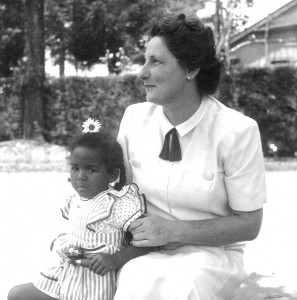
In the past few blogs I’ve written about wanting to love my birth mother Rosa, a woman I did not get to know. The mother who raised me, however, I knew and loved dearly.
She was 50 when she decided to keep me. Her name was Esther, but I called her Mutti, for she was German. She was born in 1888, while Queen Victoria still ruled in England. Picture being raised by a Victorian woman! I could say: no wonder I’m so screwed up. But it serves no purpose to judge the actions and concepts to which previous generations adhered. While I might be considered a bit complex, I am by no stretch of the imagination “screwed up.” I’ll not go into the historical and social facts underlying the suffragette and women’s movements, but Mutti, orphaned at 12, and moving to Greenwich NY at 17, became a freer woman and a rebel of sorts. She was an iconoclast for sure, keeping the rules that suited her, and liberally breaking those that didn’t. I know from Mutti’s daughter Ruth, that the family had a maid when they lived in Berlin. So I would say, they belonged socially to the better established society.
If you watch the British show Downton Abbey, consider that as a young woman, my Mutti wore clothes like the women in the show. Fashion began to change rapidly after WWI when women’s contributions and participation in the war effort gave them a new-found sense of independence. For one, the restrictive corset emphasizing a tiny waist was done away with, and some really adventurous ones, occasionally wore trousers. As a teen, perhaps it was 1954, I was invited to a fancy costume party. Mutti took me into her room where she had opened a trunk containing clothes she wore in the 1920’s. “You put that stuff on?” I exclaimed and laughed obnoxiously loudly. I could not believe the dresses that looked as if they had come from a Hollywood set. “This was considered the height of fashion; it’s only 30 years ago.” She said, a bit shocked at my reaction. The woman I knew dressed conservatively, and even for evening events did not go out in feather boas, intricate embroidery, and fur capes and stoles.
The dress I chose for the party, and I remember it well, was a deep, dark blue silk and chiffon gown with a long bodice that sat on the hips. The ¾ length skirt swung gently as I moved. The top of the bodice was decorated with silver arabesque-like embroidery accentuated by small pearls that spilled over to the short, cup-like sleeves. The best part was getting into a pair of silk stockings! I don’t know who fixed my hair, but remember two shiny silver filigree broaches on either side of my head.
I know how I loved Mutti: I loved her fiercely. I have many drawings of hearts I made for her telling her how much I loved her. They were not round juicy hearts, but oval ones so that they filled the whole page. And I painted bouquets of colorful flowers for her. I remember getting up early some mornings to shove a painting under her door for her to find it before breakfast. After breakfast we’d cuddle, me sitting on her lap discussing the drawings. Sometimes I’d be in the fold of her arms, other times I clasped my arms around her neck. As we held each other, it felt as if we were enclosed in a golden bubble.
That was when I was little, of course, when she was the most influential person in the household. Her presence was powerful and she never wavered in any of her decisions.
Mutti molded me into a poised child admired by all. Whenever I was at the verge of displaying any sort of emotion, I’d hear: “Darling, it’s time to put on your moral corset.” And that meant: control yourself! In Downton Abbey, the dowager, played by Maggie Smith, came up with a sentence that could very well have come out of Mutti’s arsenal: it was about the vulgarity of displaying excessive emotions.
As I grew older and increasingly conflicted by fears I would not dare address, I began to resent who, and where I was. And she, always focused on doing what she felt was best for me, was also tormented by my inner loneliness. She knew I needed to connect to my race; so I was sent me to a boarding school in Jamaica. But the dye, in the form of subliminal messages, had been cast and despite the effort, I remained distant to those whose features and complexion I shared.
Mutti also feared that my Nature (which in her Victorian eyes saw Blacks as lovely humans but inferior to Whites, and for sure more prone to sexual promiscuity…) could / would override the Nurture her love and education had bestowed on me. I was under her surveillance during my college years in Germany, where she feared I might be led astray by suitors wanting an adventure with an exotic girl. It was an unnecessary fear, for her Victorian indoctrinations had worked, and the last thing I would have wanted was, in any way, to be considered sexy. Another of her innermost desires for me was: get married! A bad marriage was always better than none. And here, too, Downton Abbey: where the Russian Igor contended that, for the dowager to admit to having been unhappy in her a marriage would have been a sign of poor breeding. Imagine how pleased Mutti was when Fred fell in love with me. She did, however, not live to see us married.
As I grew older she missed my exuberant childlike expressions of love for her and wondered if I still loved her. I loved her in a conflicted way. Many years later I understood the conflict of her having been a controlled Victorian woman who loved, raised, and was deeply emotionally connected to a little Black girl. She could not have done it any different, given the times. I knew Mutti, and to this day, love her deeply. She was a remarkable and brave woman who had promised to Rosa, my mother, that if the child she carried was a girl she would help raise her. If you read Split at the Root, you’ll see how the story unravels. In the end, Mutti, a woman of her word kept it, despite the havoc and tumultuous changes WWII wreaked on the family.
I would hope Mutti knew to the end that she had my love. I would very much hope she knew.
MAR

